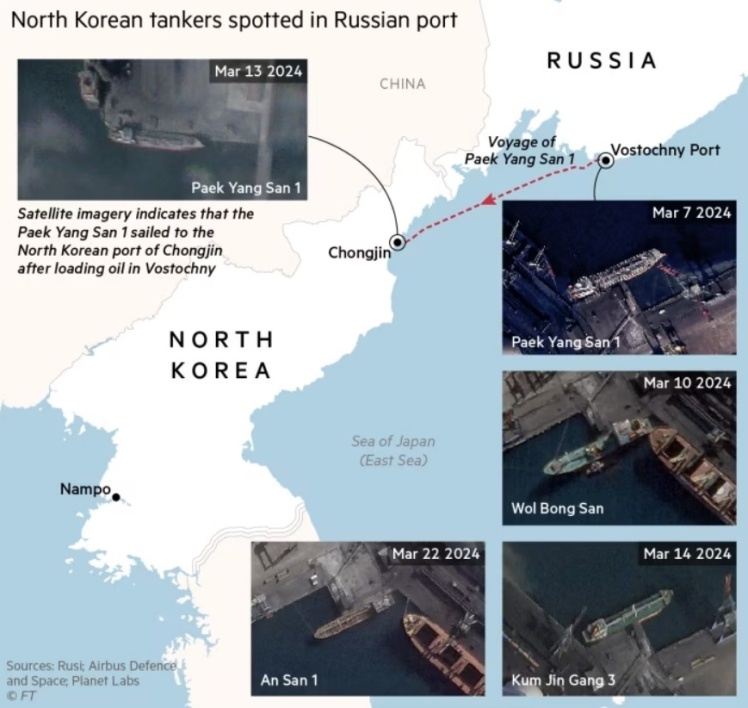Russia supplies oil directly to North Korea in defiance of UN sanctions. In exchange, the Russian Federation receives containers with weapons, in particular with ammunition.
The Financial Times writes about this with reference to satellite images that the publication received from the British Royal United Services Institute (RUSI).
According to the publication, the supply of oil began on March 7 — this is the first documented supply since the introduction of the UN sanctions in 2017. According to satellite images, in March, at least five North Korean oil tankers left the Far Eastern Russian port of Skhidnyi. The two ships then headed to the North Korean port of Chongjin, where they are believed to have unloaded.
According to RUSI research fellow Joseph Byrne, some of these ships are on the UN list, meaning they cannot even call at foreign ports. The ships seen in the Russian port are among the largest in the North Korean fleet.
In August 2023, North Korea began supplying Russia with thousands of containers of ammunition, which, according to military experts, significantly improved the situation of Russian troops in Ukraine. According to RUSI, the Eastern port was also used as a hub for Russian ships, which are probably involved in the arms trade between the countries.
"What weʼre seeing now is a clear arms-for-oil deal that openly violates sanctions personally signed by Putin," said Hugh Griffiths, former coordinator of the UN North Korea sanctions watchdog.
Satellite images showing Russian tankers in the North Korean port.
All five DPRK ships left for the port of Skhidnyi with their transponders turned off. RUSI researchers have calculated that the documented oil supplies from the East could amount to 125 000 barrels of oil products in a matter of weeks — a quarter of the allowed annual quota of 500 000 barrels.
The revelations of an apparent oil-for-arms trade between Russia and North Korea come as Western diplomats scramble to preserve the UNʼs North Korea sanctions watchdog amid fears that Russia could veto an extension of the bodyʼs mandate.
- In January 2023, the United States released evidence that North Korea had been supplying Russia with weapons since at least November 2022. The head of Ukrainian military intelligence, Kyrylo Budanov, stated at the beginning of 2024 that DPRK is now the largest supplier of weapons to Russia.
- On January 4, 2024, Western media wrote that Russia had received a batch of ballistic missiles from North Korea (several dozen) and launchers for them. On the same day, the US officially announced that Russia had short-range ballistic missiles from North Korea and was launching them over Ukraine. On January 10, South Koreaʼs ambassador to the UN said that North Korea is using Ukraine as a testing ground for its ballistic missiles with the help of Russia.
- On February 23, 2024, GUR informed that North Korea had delivered one and a half million artillery ammunition to Russia.
